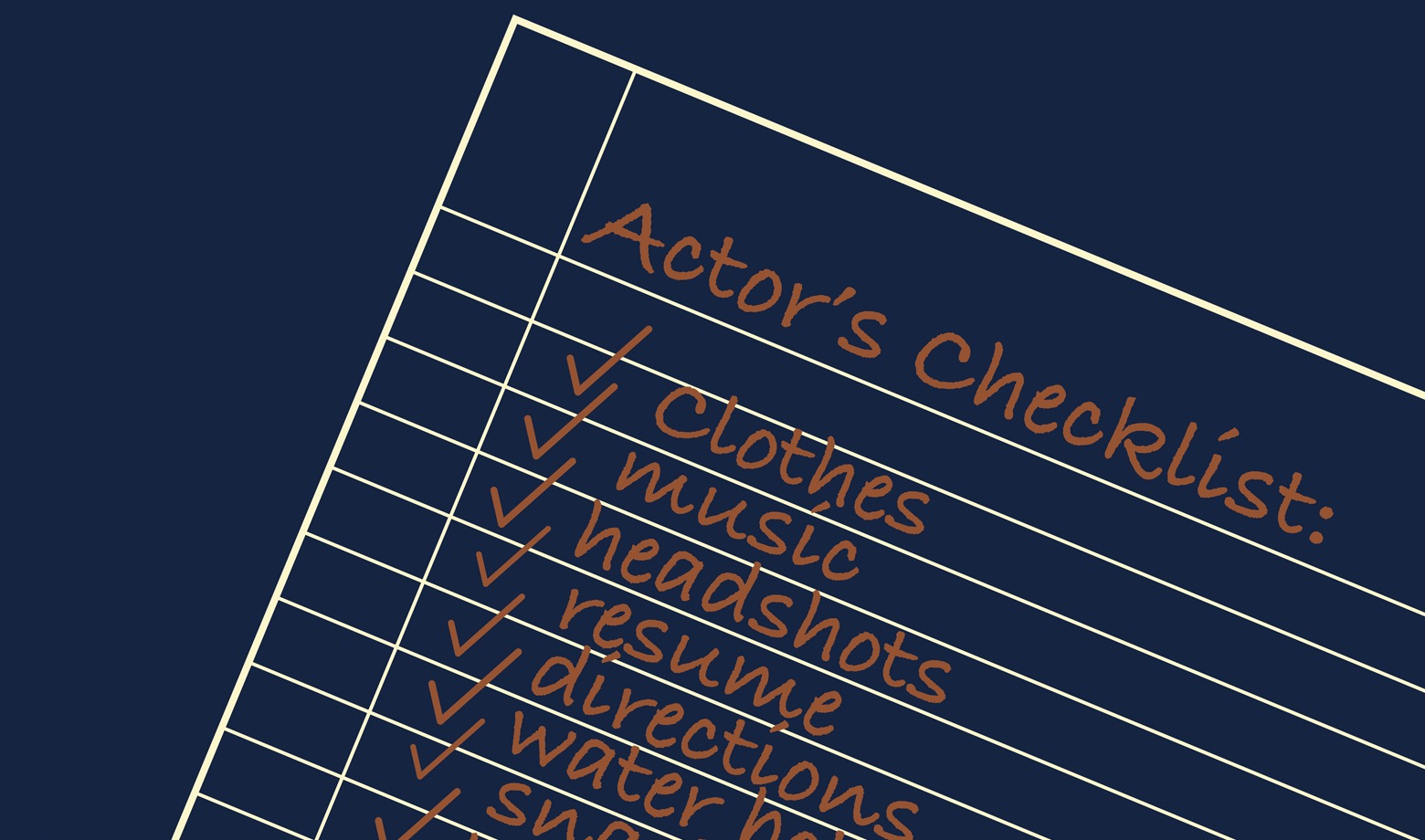
Preparing For Your Best Audition: An Actor’s Checklist
Posted Tuesday, October 20th 2015 by David McCall
Auditioning. The word strikes fear in every actor, seasoned and amateur alike. However, this doesn't have to be the case!
Auditioning. The word strikes fear in every actor, seasoned and amateur alike. However, this doesn't have to be the case. While some nerves are to be expected (it’s an audition after all), with the right amount of preparation, fear of auditioning can be a thing of the past…or at least more manageable.
Let’s address the different components that go into a great audition.
No one likes to rush, so it is best to lay everything out the night before, your clothes, music, water bottle, snack, change of clothes, directions to the audition etc. Take stock of what you have and what you might need so you can plan accordingly. You don’t want any last minute surprises in the morning. Being late to an audition is a big no-no, so let’s make sure that doesn't happen.
Your appearance is your first impression with the casting directors. Your clothing should be professional - remember, this is a job interview. No ripped clothing, no heels you can't walk in, no hair falling into your face, no suggestive clothing, and definitely no costumes. If there is a specific character you are going in for, your choice of clothing might slightly hint at that character, but nothing over the top. No stage makeup necessary, but you can certainly enhance your features with makeup.
Your choice of material is your second impression, so carefully consider what to sing. Double check the audition break down for what the auditioners are looking for. Are they asking for a classic musical theater song? A pop song in the style of Taylor Swift? And how much do they want to hear? Sixteen bars? Thirty two bars? It’s never a good idea to let the auditors be your very first audience with new material, so practice performing the song in front of an audience: your vocal coach, your parents or your friends.
Let’s take a look at our sheet music binder, or “book.” Make sure your sheet music is printed double-sided. Why? So the pianist doesn't have to turn pages too much during your song. Mark clearly where you start and finish the song. Familiarize yourself with what the accompaniment sounds like. Is there an intro. to your cut? Will you be asking for a bell tone? Will you be having the pianist play a couple of the measures prior to your start to bring you in? All this must be well rehearsed. You don’t want any music related surprises during your audition.
Finally, pack a couple copies of your headshots and resumes to take with you to the audition. Unless the breakdown mentions otherwise, come with them stapled together.
Now, breathe. You’ve planned ahead so much! And it’s still a decent hour. You’ll be getting plenty of sleep… You’ll be so well rested for your audition… Zzzz…
BZZZ! Good Morning! It’s the day of your audition! Start with a good breakfast. Not too much, but not too little. You may not be able to eat if you have to be at the audition early, so bring a snack along for the day.
Warm up time! Have you ever tried to sing right when you roll out of bed? Not so easy, right? That is because your body hasn't been warmed up yet, so do yourself a favor, and don't forget a physical warm-up before your audition. Do some stretching and some cardio to get your body ready.
Now that your body is ready, warm up your voice. About twenty minutes should be a good amount – you’re not trying to wear yourself out, just get the blood flowing. Warm up your belt and your head voice, do some agility and breathing exercises, and then perhaps sing through your audition song.
You’re so prepared! You left with plenty of time to arrive at the audition. From the moment you walk into the building, imagine you are at a job interview. Sign in with the audition monitor, and be sure to treat them well. You never know who this person is, and if you are rude, you can be sure that they will pass that information back to the creative team. After signing in, you will probably have some time to kill while waiting for your turn. You will likely know a lot of actors who will be sitting there waiting for their turn as well. Try to refrain from gossiping and getting chatty with the other actors. This is your time to prepare yourself to go in that room and blow the auditors away. Whether you meditate, read a book quietly, or run your material, this is your time to focus. Sometimes you will be given sides that you have to look over - this is your time to devote to that. Though chatting is tempting and it might seem like everyone else is doing it, stay focused. Note that warming up should be done by this point; it is not polite to do loud vocal warm or physical warm-ups while other actors are trying to concentrate.
You’ve have prepared yourself as well as you can for your audition. Here it comes. The auditor is calling your name. You’re about to enter the room…
In the next article, we will discuss what goes on in that audition room, and how you can take control of your audition. Stay tuned!

David McCall
Senior Voice Teacher, Head of Vocal Development
David has become one of the leading instructors of Contemporary Voice in New York City, with clients ranging from Broadway singers (Billy Elliot, Matilda), Classical and sacred music singers, cantors in New York City Synagogues, to Professional Rock and Pop artists, some of which have toured and been signed to record contracts, appeared on shows like The Voice and American Idol, and performed at venues such as SXSW. Additionally, David has taught as a Master Teacher of Contemporary Voice for the NYSTA Comparative Vocal Pedagogy series.

Does Practicing Help? An Informal Study (Part II)
In this article, Andy summarizes a six-week informal study showing that specific, consistent, and motivated practice — even in small amounts — helps singers improve.

NYVC Artist Spotlight: Anayka She
NYVC's Kacey Velazquez interviews Anayka She about her writing process, the power of social media, and what's coming up for the artist...

Building Resilience: Sticking with Singing Even When It’s Hard
In this article, we will explore some principles I find useful for practicing singing that may help us overcome a "rut" in our progression toward vocal growth. Practicing singing can at times feel impossible, but a shift in mindset can potentially change that feeling.